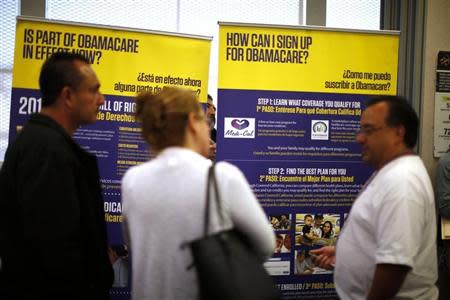U.S. has not determined legal authority to delay Obamacare mandate

By David Morgan WASHINGTON (Reuters) - The U.S. administration has not determined whether it has legal authority to delay Obamacare's individual mandate, which requires most Americans to enroll in health insurance or pay a tax penalty, a senior Treasury official said on Tuesday. Mark Iwry, senior adviser to Treasury Secretary Jack Lew, told U.S. lawmakers the administration sees no reason for delay given that the law allows for exemptions and provides financial assistance for those unable to afford health coverage on their own. He said the provision also underpins reforms that protect sick people from discriminatory market practices. "If we don't believe that it is appropriate to be delaying that provision ... then we don't reach the question of whether we have legal authority," Iwry said in testimony before the Republican-controlled House Ways and Means Committee's Health subcommittee. The administration has delayed numerous segments of the 2010 law known as Obamacare during four years of implementation and continues to face speculation about possible new postponements for provisions, including the individual mandate. Iwry's testimony provided the most detailed evidence to date that the administration was not moving toward delay. Republicans have called repeatedly for a delay in the individual mandate since last summer, when the White House gave employers extra time to comply with a sister provision that requires midsize businesses with at least 50 full-time workers to offer health coverage to their employees or pay a penalty. Administration officials have consistently rejected the idea of postponing the individual penalty, describing the employer mandate delay as a response to employers who said they needed more time to meet the law's requirements. Hoping to turn the topic into a campaign issue in November's election battle for Congress, Republicans have pressed officials to learn whether the administration could delay the provision under the law, if it chose to do so. The individual mandate is one of the most unpopular provisions of a law that is unpopular with large numbers of voters. The Patient Protection and Affordable Care Act requires the government to penalize individuals who violate the law. The administration has delayed the enforcement of other provisions required by the law, including one that bans insurance policies that offer substandard benefits. "The American people still have not been given an adequate answer about questions of fairness. We understand the mandate on businesses is costly and that is why you gave big business a break. But why is it fair to not give the same break to individual Americans and their families?" said Representative Kevin Brady of Texas, the Health panel's Republican chairman. Brady asked Iwry more than half a dozen times to clarify whether the Treasury Department has analyzed the question of legal authority or reached a decision on whether it can take action. "That is a question that we don't reach because we do not believe that we have any cause to," Iwry said. The administration official said he would seek further guidance from Treasury's legal staff and report back. The exchange between Brady and Iwry puzzled the panel's senior Democrat, Representative Jim McDermott of Washington. "You decide, is there something we should do to make this thing work, and then you look to see if you have authority to do that, is that a fair shortcut to the answer?" McDermott asked the Treasury official. "Mr. McDermott, I'm in general agreement with the way you're approaching this," Iwry replied. Under the healthcare law, President Barack Obama's signature domestic policy achievement, most Americans who do not enroll in health coverage for this year will pay a penalty when they file their 2014 income tax returns next year. Iwry said a delay is unnecessary partly because the penalty phases in over three years. It rises from the greater of $95 per adult or 1 percent of family income for 2014 to $695 per adult or 2.5 percent of income for 2016. (Reporting by David Morgan; Editing by Jonathan Oatis)

